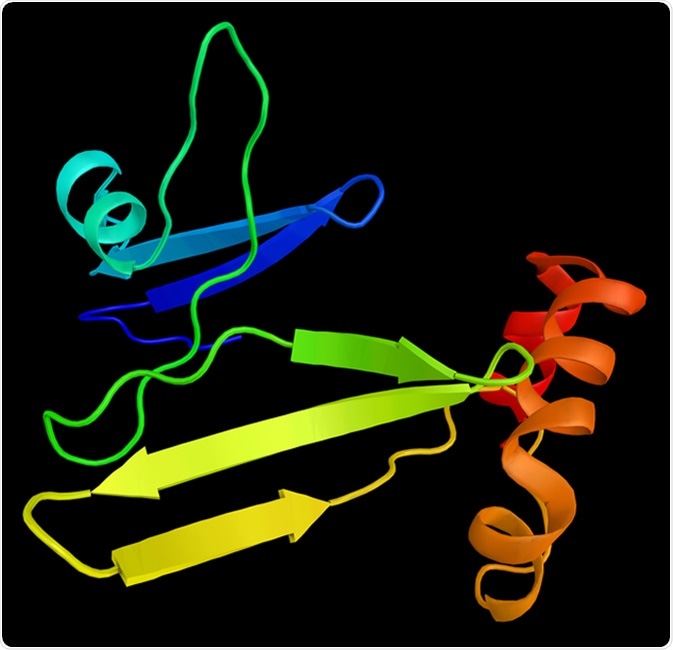Ghrelin is a peptide hormone produced by the gastrointestinal tract, with multiple actions in the body. Its best-known function involves energy metabolism. Ghrelin is an orexigenic hormone which regulates energy intake by stimulating the appetite, resulting in adipogenesis (the formation of fat cells) and reduced lipolysis (the breakdown of lipids).
Furthermore, ghrelin transmits peripheral signals concerning energy reserves in the body to the hypothalamus via neuropeptide Y (NPY) and agouti-related protein, acting via its receptor - the growth hormone secretogogue receptor (GHS-R).

Ghrelin, the "hunger hormone", also known as lenomorelin, a peptide hormone produced in the gastrointestinal tract which functions as a neuropeptide in the central nervous system. 3d rendering. Image Credit: ibreakstock / Shutterstock
Ghrelin and Stress
There is a strong connection between the central nervous system and the gastrointestinal system which is partly responsible for maintaining steady levels of energy. When this axis is disrupted, metabolic imbalances result, as is the case in eating disorders.
The same types of disturbances are, however, found in depression and stress. Ghrelin is released in response to starvation or low energy stores, and it transmits the peripheral signal to the brain. Stress is another stimulus for ghrelin release, and high ghrelin levels are thought to bring about an anxiolytic effect which mitigates depression. At the same time it results in increased food intake and increased body weight.
Ghrelin seems to regulate energy intake in stressful situations in order to bring about appropriate behavioral responses. Ghrelin also seems to be involved in depressive mood disorders in at least a subset of patients. Associations have been found between major depression and lower plasma ghrelin concentrations. On the other hand, high ghrelin levels were identified in chronic stress.
Ghrelin and the Brain
Ghrelin is predominantly synthesized peripherally, but a small part is produced in the hypothalamus. It is linked to many behavioral responses in stress situations. Chronic stress causes ghrelin levels to rise, which in turn alters many parameters in the brain and endocrine system.
When individuals are under chronic stress, cortisol levels rise and lead to increased appetite and weight gain by rising ghrelin secretion. The final outcome is a significant change in glucose and lipid metabolism, mood and behavior.
The parts of the brain that take part in mood homeostasis and emotional states also participate in reward processing. These include the medial prefrontal cortex, the caudolateral orbital cortex, the limbic system, brainstem, midbrain, and the amygdala-hippocampal regions.
The aforementioned structures undergo physical changes in long-term depression. The hypothalamic-pituitary-adrenal (HPA) axis is also involved in mood equilibrium, and receives inputs from the paraventricular nucleus as well. It is important to note that these areas are also functional in determining feeding behaviors.
Therefore ghrelin also takes part in reward and motivation pathways, as well as energy intake modulation. This links it to stress and depressive disorders. However, it may produce or alleviate anxiety depending on the psychological makeup of the individual, as well as the neuronal architecture.
Ghrelin and Chemical Transmitters
Stress-related increases in ghrelin are part of coping mechanisms and may be instrumental in alleviating the anxiety. Various parts of the brain seem to be involved in this network, including the HPA, the autonomic nervous system, and serotonin-producing neurons. Serotonin is known to elevate mood, but it also modulates ghrelin activity.
Corticotropin-releasing hormone (CRH) levels rise in response to ghrelin, which in turn causes increases in corticosteroid secretion. CRH itself plays a negative feedback role on ghrelin expression.
Individuals with severe anxiety or depression often have reduced appetite or an overactive HPA. This may induce corticosteroids to increase, with a rise in ghrelin levels as a result. High ghrelin levels often have an antidepressant effect, and may be a compensatory mechanism in response to stress, acting via food restriction or the loss of weight.
References
Further Reading
Last Updated: Feb 26, 2019